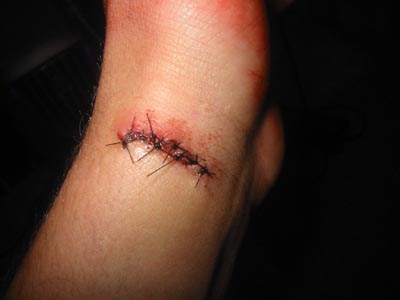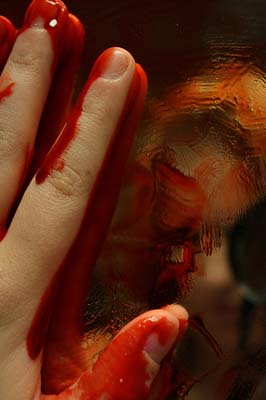pages: 1-50
Seven months ago on a rainy March night, the main character of this book, Willow, her parents drank a little too much at dinner and asked her to drive them home. But they never made it - Willow lost control of the car and killed both of her parents. She is now seventeen and lives with her older brother, who can barely stand to speak to her. He's married and has a daughter, and Willow doesn't feel like she belongs with them. She feels like a nuisance. She had to leave behind her old home, her friends, and her school. But she's found a way to survive, to numb the new reality of her life: She is secretly cutting herself.
Thursday, December 30, 2010
Saturday, December 25, 2010
That's the problem with cutting. Once you start, you can't stop. It's addicting, cutting is my drug. It serves its purpose perfectly. "Once I cut, I forget about everything that has been wrong. All that is left is my concentration on my cut. I forget about everything but the pain. Pain has become my world."
pages 252-281 pretty much focused around this quote.
pages 252-281 pretty much focused around this quote.
Tuesday, December 21, 2010
Voices
pages 187-252
"Depression is something so unrealistic. It makes you believe these voices. You are overcome by these demons and everyone else sees through the tinted glass but YOU can see the real world, the real you, the real humanity, the real pain. The agony, you can't explain it or take a painkiller but you can just sit, unable to move or connect with reality, and you just stare, feeling anxious and nervous and ill, can't voice it, so you cut instead. That's where the real problem starts. The blood, the addiction.
This whole section of the book pretty much talked about "voices" that people suffering from depression sometimes say they hear. The voices tell them that they need to punish themselves, that they deserve the pain and suffering they're going through, and they even deserve more. That they're a failure and aren't good for anything. They can't escape the "voices" because they're so used to "listening to them". The voices come when they start over-thinking things. Once they're alone, they voices get louder and eventually the "cutter" gives in.
Friday, December 17, 2010
their eyes were watching God
pages: 1-146
In Their Eyes Were Watching God, we meet a girl named Janie. Her mother, Leafy, left her when she was just a baby, so she was raised by her grandmother, who she calls Nanny. They lived in a house in the backyard of a white family that Nanny worked for. When Janie was little she though she was white just like all the other kids she played with and was around all the time. One day a man came by the house and took a picture of all the kids together, and when the pictures were finally printed Janie looked at it and wondered where she was. She knew the spot in which she should appear, but in that place there was a little dark-skinned girl. After she asked who the little color girl was everyone laughed and it was explained to her that the colored girl was in fact her. She couldn't get over the fact that she wasn't white. Up until that point she had always just assumed she was white. I don't understand how she never realized that she had darker skin than the rest of the kids though,. I mean, didn't she ever look down at her hands or legs and realize that they were darker? As time went on, Janie married Logan Killips, Joe, and finally Tea Cake, (who's her latest husband.) After marrying Tea Cake they move to the Everglades and pick beans and cane sugar in the fields. They get a house, and meet many interesting people.
In Their Eyes Were Watching God, we meet a girl named Janie. Her mother, Leafy, left her when she was just a baby, so she was raised by her grandmother, who she calls Nanny. They lived in a house in the backyard of a white family that Nanny worked for. When Janie was little she though she was white just like all the other kids she played with and was around all the time. One day a man came by the house and took a picture of all the kids together, and when the pictures were finally printed Janie looked at it and wondered where she was. She knew the spot in which she should appear, but in that place there was a little dark-skinned girl. After she asked who the little color girl was everyone laughed and it was explained to her that the colored girl was in fact her. She couldn't get over the fact that she wasn't white. Up until that point she had always just assumed she was white. I don't understand how she never realized that she had darker skin than the rest of the kids though,. I mean, didn't she ever look down at her hands or legs and realize that they were darker? As time went on, Janie married Logan Killips, Joe, and finally Tea Cake, (who's her latest husband.) After marrying Tea Cake they move to the Everglades and pick beans and cane sugar in the fields. They get a house, and meet many interesting people.
Thursday, December 16, 2010
ER
pages 140-187
Did you know that 472,000 emergency room visits per year are the result of deliberate self-inflicted injuries? This, of course, doesn't include everyone who self-harm. Some people's self injuries either just aren't bad enough for them to need to seek medical attention, or they're too scared of someone finding out about their self-injury to bring themselves to go to the hospital to get their injuries treated.
Did you know that 472,000 emergency room visits per year are the result of deliberate self-inflicted injuries? This, of course, doesn't include everyone who self-harm. Some people's self injuries either just aren't bad enough for them to need to seek medical attention, or they're too scared of someone finding out about their self-injury to bring themselves to go to the hospital to get their injuries treated.
Monday, December 13, 2010
Why?
pages 79-140
Believe it or not, most cutters don't blame anyone else but themselves for what has happened to them to cause them to start the cutting. Why? Because most feel like they deserve everything they've experienced. If they've been abused, they get it in their heads that they did something to deserve it. If they're sick, they believe God is punishing them for something bad they've done. You could tell them that they've done nothing wrong as many times as you want, but it's not going to change anything. They're not going to believe you. They have permanently embedded that it's their fault into their brains. Another weird conclusion some self-harmers come to is that their scars are beautiful, every single one of them. Some see them as mile markers they've gotten past, and others view them as reminders that they have the power to hurt themselves whenever they please.
Believe it or not, most cutters don't blame anyone else but themselves for what has happened to them to cause them to start the cutting. Why? Because most feel like they deserve everything they've experienced. If they've been abused, they get it in their heads that they did something to deserve it. If they're sick, they believe God is punishing them for something bad they've done. You could tell them that they've done nothing wrong as many times as you want, but it's not going to change anything. They're not going to believe you. They have permanently embedded that it's their fault into their brains. Another weird conclusion some self-harmers come to is that their scars are beautiful, every single one of them. Some see them as mile markers they've gotten past, and others view them as reminders that they have the power to hurt themselves whenever they please.
Wednesday, December 1, 2010
pages: 68-79
Most start out with one tiny scratch, but then the need to go deeper increases as time goes on. The first time most people cut they love the "release" they feel, but afterwards feel like what they have done is insane, and they are crazy. They go on to have cutting bouts, which are generally set off by real, or even perceived experience. Their sense of themselves and the ability to control their lives has been dictated so much by external events that they believe their existence depends on how others see them. They often see "nothing" when looking in the mirror, just a body empty of a soul.
Most start out with one tiny scratch, but then the need to go deeper increases as time goes on. The first time most people cut they love the "release" they feel, but afterwards feel like what they have done is insane, and they are crazy. They go on to have cutting bouts, which are generally set off by real, or even perceived experience. Their sense of themselves and the ability to control their lives has been dictated so much by external events that they believe their existence depends on how others see them. They often see "nothing" when looking in the mirror, just a body empty of a soul.
Subscribe to:
Posts (Atom)






